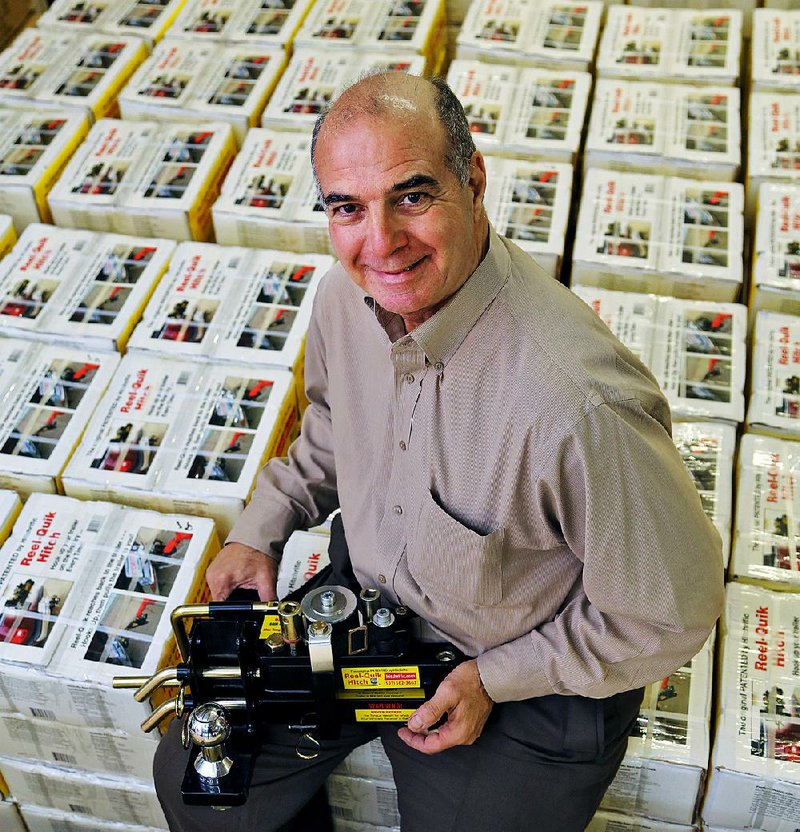For Mike Rebick, getting a patent for a unique way to hitch a trailer to a pickup or car was just the first step.
The bigger issue was figuring out whether people would want to buy his invention, because consumers view products far differently than inventors such as himself who have invested time, faith and money into an idea.
Patent in hand, the question becomes, "Am I prepared to spend the money to go to market?" the Little Rock resident said.
That answer became yes this November with the Reel-Quik Hitch, now available online from Rebick's website, hitchrific.com.
"Once you figure out an idea is unique, you've got to decide if it's marketable," said Rebick, 63, who secured a patent in October 2009 along with a co-inventor, the late Ivan Lopes Jr. of Fountain Lake.
The hitch uses a ratcheting pulley system and support plates that allow a hitch ball to be extended toward a trailer's hitch and then retracted into a secure position for towing. Rebick said being able to easily move the hitch ball toward a trailer means that drivers don't have to repeatedly back up to precisely place the ball under the hitch to make the connection -- something that people who frequently hook up a heavy boat or utility trailer can appreciate.
"The main thing is how it extends and pulls back," Rebick said. Called a "trailer hitching machine" in patent documents, the device allows the ball to move in up to an 18-inch arc to reach toward a trailer hitch.
Rebick said he's always had a mechanical bent. He put himself through Ohio State University, working at service stations while earning a degree in marketing. After moving to Little Rock, he and his wife, MaryJane, founded Copy Systems Inc., which they sold in 2004.
It took three years, beginning in 2006, for Rebick and Lopes to take the Reel-Quik device from an idea to a working model for a patent prototype. Lopes, a machinist, would spend hours at a time crafting and adjusting parts to make the prototype, Rebick said.
The design is rated as a Class III hitch, meaning it can handle loads of up to 6,000 pounds. To be insurable, the hitch had to be tested to SAE International standards. SAE sets standards used in engineering, such as the automotive and aerospace industries. To do this, he took a prototype to the University of Memphis, where it was placed on a machine that measured its strength and resistance to distortion under load.
The Reel-Quik Hitch isn't Rebick's first attempt to design a trailer hitch.
After a few years of trying out different designs, he got a patent in 2005 for a hitch that allowed users to easily adjust the ball's height. But the idea stalled after he spent a year inspecting and repairing the first 200 units made to his specifications by a factory in China. And the device never caught on among users.
Developing an idea takes research, he said. And figuring out if it has commercial potential takes even more.
"Why invent it or build one if it already exists?" Rebick said. While an inventor might be able to sell a patent to a company since it's more efficient to deal on a business-to-business level, consumer interests are far broader, he said.
Rebick believes his latest design is far more marketable.
Once the patent prototype was approved by the U.S. Patent Office, Rebick said he and Lopes continued to refine the hitch and provided some early versions to acquaintances to put through real-world testing.
"Build, test, tweak. You've got to be committed. It takes time," Rebick said. But things finally reached the point where he decided to go ahead and manufacture the hitch by mid-2013.
With the help of a Texas-based broker, he found another manufacturer in China who produced 800 of the new-style hitches. He said he inspected each one when they arrived.
Each 42-pound hitch has powder-coated metal surfaces and rust-resistant hardware. They are priced at $349. Rebick said he purposely had the packaging designed to fit inside a flat-rate U.S. Postal Service box for shipping.
Rebick has started a broad sales push that includes meeting with U.S.-based hitch manufacturers and recreational vehicle companies to introduce his product. He's also started his website and is talking with potential retailers, such as car and recreational vehicle dealers and outdoor supply stores.
"The problem is getting people in the industry to take on a product that sets a new standard," he said.
So far, Rebick said he's sold about 50 of the devices. While finding a partner to distribute the hitch would be the best marketing solution, he said he's willing to invest the time and effort to take his product to market and build a reputation online and via word-of-mouth as more units are purchased.
"The ability to hook a trailer up by yourself? That's priceless," Rebick said.
SundayMonday Business on 12/28/2014
